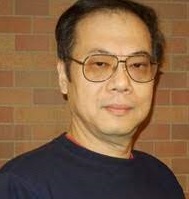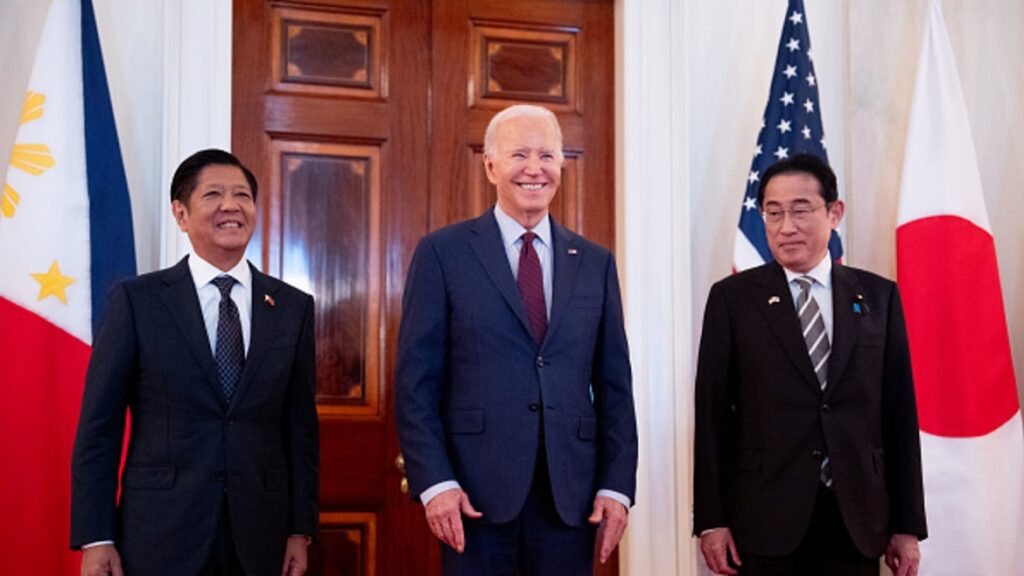World Geostrategic Insights interviews Masahiro Matsumura on the significance of the trilateral summit between Joe Biden with Philippine President Ferdinand Marcos and Prime Minister Fumio Kishida; the developments in Japanese rearmament; and prospects in China-U.S. relations.

Masahiro Matsumura, Ph.D., is Professor of International Politics and National Security at St. Andrew’s University in Osaka and a 2024 ROC-MOFA Taiwan Fellow-in-Residence at the Taiwan Center for Security Studies, National Chengchi University’s Institute of International Relations
Q1 – In recent months, tensions between China and the Philippines – which are increasingly asserting their territorial claims – have reached levels not seen in years. Against this backdrop, President Joe Biden hosted an unprecedented trilateral summit with Philippine President Ferdinand Marcos and Prime Minister Fumio Kishida at the White House on April 11. In a joint statement, the three leaders expressed “deep concern about the dangerous and aggressive behavior of the People’s Republic of China.” President Biden stated that the “U.S. commitment to the security of Japan and the Philippines is unwavering” and pledged to defend the Philippines in the event of an “attack” from China. He also promised closer economic and technological cooperation, and to develop major infrastructure projects in the Philippines. What is the real significance of this meeting? Is U.S. positioning in the Indo-Pacific once again becoming Washington’s priority, overshadowing the strong political commitment and U.S. military support in Ukraine?
A1 – Arguably, the impact of the trilateral meeting on Beijing is limited, if not marginal. Certainly, Beijing is keen on the meeting due to its soft-balancing effects through defense-diplomatic encirclement on its mental map. Beijing’s strategic culture is biased in favor of the approach to winning without fighting and first attacking an enemy’s mind, not armed forces, to deprive it of the will to fight.
Yet, realpolitik calculations will matter more. During the Cold War, the U.S. hegemon had concurrently controlled the three strategically vital regions, or Europe. Middle East and East Asia, according to the strategy of containment against the Soviet Union. Today, the hegemon is barely able to make armed intervention to one of the three, with its power severely strained by growing burdens consequent on the War in Ukraine and the Gaza conflict. Inadequate U.S. deterrence power against China has to be supplemented with hard and soft power of allies and friendly nations. In this light, the trilateral meeting is a manifestation of U.S. weakness, not strength. Despite the sea changes of the global security environment, Japan only has the Plan A to cling to the U.S. hegemony, without a Plan B.
In addition, the Filipino move demonstrates its strategic distancing from the ASEAN, involving debilitation of its unity against the Chinese regional hegemonic aspirant. The organization is now severely divided between maritime, peninsular and continental member states. Also, the policy shift reveals not only latent division among the Filipino political elites but also latent instability of domestic politics. In fact, the immediate past Filipino President Rodrigo Duterte approached Beijing, while tactically distancing from Washington. The incumbent President F.R. Marcos has got suddenly close in on Washington, reminiscent of his father, former president F. E. Marcos who was a pro-U.S. poppet and dictator of the country. There is a complicated interplay of strategic calculation and the love and hatred toward the former U.S. suzerain.
Q2 – The American president had received Fumio Kishida on April 10 for a prelude visit to his trilateral meeting with Ferdinand Marcos. On this occasion, US President Joe Biden and Japanese Prime Minister Fumio Kishida announced the strengthening of bilateral defense ties, which have been very important since the end of the Second World War. The U.S. and Japanese armies will work together to achieve greater “interoperability”, while the U.S. has pledged to provide material and technological support for certain Japanese military projects. What’s your opinion on developments in military ties between the USA and Japan? In general, could a significant rearmament of Japan represent a critical political change in the region?
A2 – With the Plan A to cling to the U.S. hegemony and without a Plan B, Tokyo only has upgraded its defense strategy that will considerably improve operational coordination and cooperation toward possible collaboration. Yet, Tokyo has fallen into the ostrich syndrome to ignore the grand-strategic need of thinking unthinkables after hegemony and preparing for transition. In this light, Tokyo’s move toward significant rearmament will surely proceed within the framework of the U.S. hegemonic military system. This will only beef up Japan’s military power that is supplementary and complementary to the U.S. power, not rendering Japan to be strategically independent and reinforcing the U.S.-led regional international status quo.
Q3 – Joe Biden assures that strengthening cooperation with the Japanese military is “purely defensive.” However, China did not like it. In particular, it denounces parts of the joint communiqué between U.S. President Joe Biden and Japanese Prime Minister Fumio Kishida that indirectly criticize Beijing on the issue of Taiwan or the Senkaku/Diaoyu Islands, disputed with Tokyo in the East China Sea. “The United States and Japan, in defiance of China’s serious concerns, have defamed and attacked China on Taiwan and maritime issues, …………………they have shamelessly interfered in China’s internal affairs, in gross violation of the basic norms governing international relations”, denounced Mao Ning, spokesman for China’s Foreign Ministry. What is your opinion? Could China-U.S. relations cool again after the apparent improvement in recent months?
A3 – . Given growing Beijing’s aggressiveness against the status quo, Washington and Tokyo should never please Beijing, but displease it. In fact, Beijing’s response with displeasure attests to deterrence effects on it. Of course, this is different from offensive actions and statements that would unnecessarily provoke Beijing. Washington and Tokyo have to carefully craft actively and passively defensive actions and statements. They have so far followed this rule of thumb very well. The trilateral meeting has just exerted limited soft-balancing effects, which itself alone will unlikely trigger a rush into a U.S.-China Cold War.
Masahiro Matsumura, Ph.D. – Professor of International Politics and National Security.







